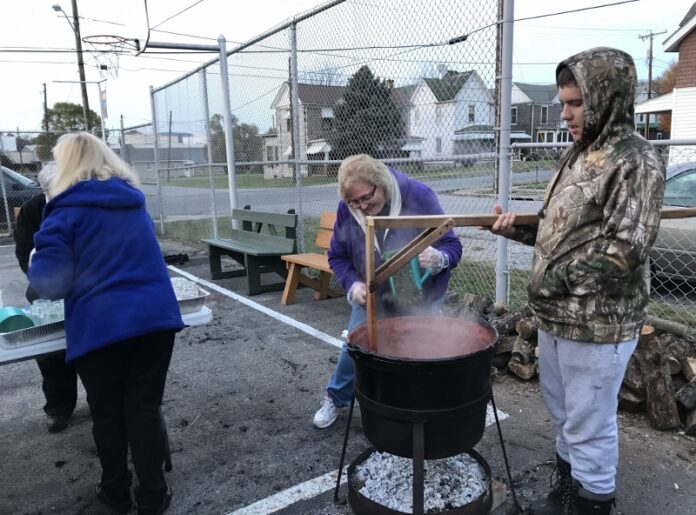
One of the chilliest days in November brought about 50 people out to take turns stirring several great vats of bubbling apple butter. The crowd gathered on a recent Saturday on the blacktopped picnic area of Keystone Community Center in Southeast Roanoke. A reporter searched in vain for the lady in charge of the event, Pat Carter, 61, who had her head temporarily buried in a game she was conjuring for the children who had come to be a part of the festivities.
Children of varied colors and sizes hooped and hollered around the attractive blond lady with the cornflower blue eyes. She knew all of them by name and had a special comment for each one.
“This community would be lost without her,” said Rayma Mary Mills, a volunteer at Keystone. “She has really brought this community together,” added Mills, who runs a food pantry nearby.
Carter was born and reared in the rolling country hills of Roanoke County where her dad represented five generations of agricultural farmers. She graduated from Hollins University in 2008 with a degree in English and immediately began job hunting.
“I couldn’t find a job for three months after graduation,” said Carter, “but I finally noticed a preschool director’s position open at Melrose Baptist, so I took it in May of 2008.”
However, by September of ’08, Carter discovered that the Baptist Community Center in Southeast needed a site director. This was a new position that had been supported by the Women’ s Missionary Union (WMU), but Roanoke Valley Baptist Association (RVBA) took over the mission in 2008.
After praying about it, I decided that the site director position was the right one for me. Keystone was then known as the Baptist Community Center. But in 2015, the make-up of RVBA’s board changed. They voted to end all financial support for the community center, sighting its failure to help enough city residents. According to Carter, the center would either have to close, or figure out a way to support itself.
“I was at the board meeting where I saw that Pat was a nervous wreck,” said Hunter Burns, 13. Burns, a resident of Southeast Roanoke, is a member of Keystone’s Youth Advisory Board. “We all thought the center was going to shut down, but a lot of people from the community showed up at the meeting and spoke up for keeping the center going – on faith.”
Burns took a break from stirring the apple butter to look a reporter straight in the eyes. “People are trying to get God out of everything,” he said. “But we need the Lord here on these streets; we all do.”
Burns and others said that the community center has brought God back in myriad forms. Volunteer Melanie Overfelt said the center has helped local families to start and support 25 gardens in the neighborhood. One of the most outstanding gardens stands directly across the street from the Keystone center next to a burnt-out house that Carter purchased through an arrangement with the city in order to have access to water. The Ten Commandments can be seen clearly from its gates.
“We call it a neighborhood garden,” Carter said, “because it’s just one of many gardens maintained by the volunteers here and by individual families.”
Carter and her Keystone volunteers teach families (including children) how to till, plant seeds, cultivate crops, maintain the gardens, harvest, and preserve food through the art of old-fashioned canning. She has a gleam in her eye when she discusses the importance of the butterfly plant in pollination and other growing secrets that she has accumulated over the years.
“The garden teaches kids a lot,” said volunteer Melissa Evans. “It keeps them busy and out of trouble; In fact, they beg to come to Pat’s garden and help.”
In addition to the garden program that serves a hundred individuals, Keystone’s missions have included a food pantry, an afterschool program that has served as many as 28 kids from Fallon Park Elementary School (including a bible study), a learning group for preschoolers, a meals program, and classes in both quilting and canning.
Children who attend Keystone’s afterschool program are given meals and often extra food to share with their families.
“Hunger is a real problem in Southeast Roanoke,” said Carter. That’s why she picks up monthly donations from businesses like Fresh Market where the food is still good and usable, but the store would have to throw it away.
Carter proudly claims the Cherokee blood of another determined woman who was her great-grandmother. She plans to keep on plugging away at Keystone, even though the center must raise $60,000 to stay afloat next year. Her connection to the earth is as deep as her commitment to the people of the community is wide.
“My faith in God influences me 100 % in this mission,” she said. “I believe in what that verse, Mathew:28, says when it tells of The Great Commission. I’m just fulfilling what the Lord has asked me to do.”
Carter and her volunteers feel that Keystone offers a place of hope and security for individuals, families and children of all races and cultural backgrounds.
“See?” Carter said from her bench in the garden, tracing the happy run of a squirrel up the white picket fence and the dancing dart of a butterfly surveying its own bush, “It’s so light and peaceful sitting here, even though a heavy mist of violence surrounds us.”
Mary Ellen Campagna
Postscript: Individuals, churches, businesses, and agencies wishing to donate to Keystone Community Center may send a check or money order to Keystone Community Center, 101 17th Street, SE Roanoke, Virginia 24013. Volunteers are also needed.
.


